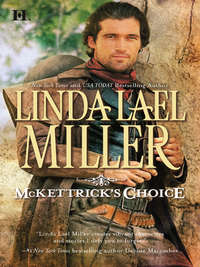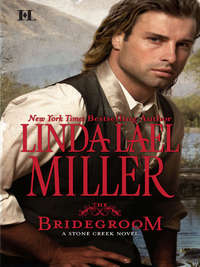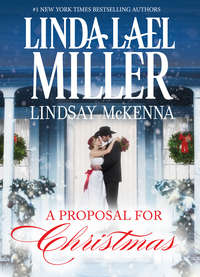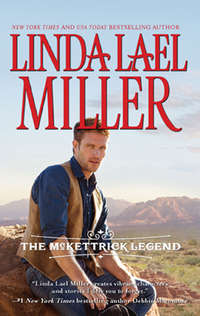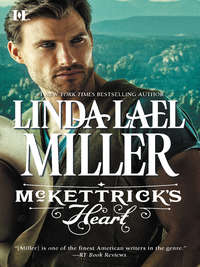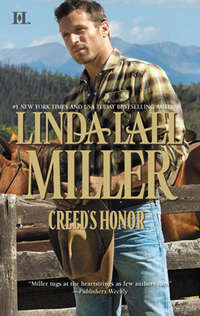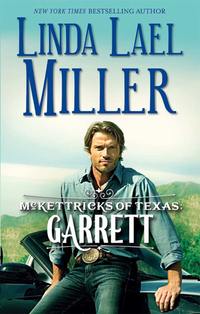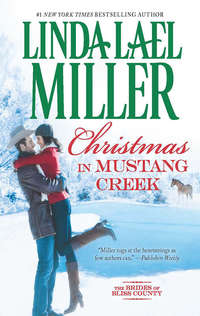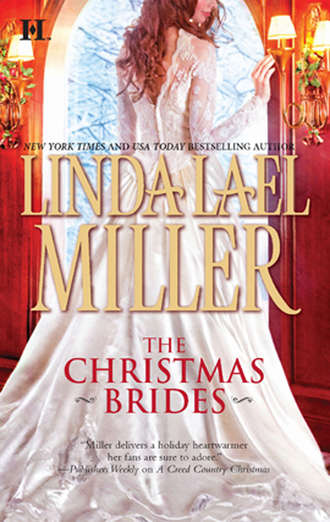
Полная версия
The Christmas Brides: A McKettrick Christmas
“It was quick,” Dr. Shane said, standing in front of her now, placing a hand on her shoulder. “Did you know them?”
Lizzie shook her head, struggling to compose herself. Her grandfather’s deep voice echoed in her mind.
Keep your backbone straight—
“Were they—were they lying there, side by side like that?” It was a strange question, she knew that, even as she asked. Perhaps she was still in shock, after all. “When you found them, I mean?”
“I moved them,” the doctor answered, “once I knew they were both gone.”
Lizzie nodded. Just the act of standing up straight and squaring her shoulders made her feel a little better.
A slight, grim smile lifted the corner of Dr. Shane’s finely-shaped mouth. “These rescuers you’re expecting,” he said. “If they’re anything like you, we might have some hope of surviving after all.”
Lizzie’s heart ached. What she wouldn’t have given to be at home on the Triple M at that moment, with her family all around her. There would be a big, fragrant tree in the parlor at the main ranch house, shimmering with tinsel. Dear, familiar voices, talking, laughing, singing. “Of course we’ll survive,” she heard herself say. Then she looked at the dead men again, and a lump lodged in her throat, so she had to swallow and then ratchet her chin up another notch before she could go on. “Most of us, anyway. My papa, my uncles, even my grandfather—they’ll all come, as soon as they get word that the train didn’t arrive.”
“All of them McKettricks, I suppose.”
Lizzie nodded again, shivering now. The boiler wasn’t putting out any heat at all. Most likely, the smoke stack was full of snow. “They’ll get through. You wait and see. Nothing stops a McKettrick, especially when there’s trouble.”
“I believe you, Miss McKettrick,” he said.
“You must call me Lizzie,” she replied, without thinking. He had, though only once, and she needed the normality of her given name. Just the sound of it gave her strength.
“Lizzie, then,” Dr. Shane answered. “If you’ll call me Morgan.”
“Morgan,” she repeated, feeling bewildered again.
He went back to the bodies, gently removed the conductor’s coat, then laid it over Lizzie’s shoulders. She shuddered inside it, at once grateful and repulsed.
“Let’s get back to the others,” Morgan said quietly. “There’s nothing more we can do here.”
Their progress was slow and arduous, but when they returned to the other car, someone had lighted lanterns, and the place had a reassuring glow. Most of the passengers seemed to have regained their composure. Even Woodrow had ceased his fussing; he peered alertly through the bars of his cage, his snow-white feathers smooth.
Whitley had emptied his flask and either passed out or gone to sleep, snoring loudly, clinging possessively to his blanket even in a state of unconsciousness.
“I’d better take a look at him,” Morgan said ruefully, stopping by Whitley’s seat and opening his kit, pulling a stethoscope from inside. “My preliminary diagnosis is pampering by an overprotective mother or a bevy of fussy aunts or spinster sisters, complicated by a fondness for strong spirits. I’ve been wrong before, though.” But not very often, he might have added, if his tone was anything to go by.
Lizzie could not decide whether she liked this man or not. He certainly wasn’t one to remain on the sidelines in a crisis, which was a point in his favor, but there was a suggestion of impatient arrogance about him, too. Clearly, he did not suffer fools lightly.
She approached the Halifax family and found them still burrowed down in the faded quilt. The peddler had lighted another cigar, and the soldier was on his feet, trying to see out into the night. Darkness, snow and the reflected light of the lanterns on the window glass made it pretty much impossible, but Lizzie understood his need to be doing something.
“Some Christmas this is going to be,” he said, turning when Lizzie came to thank him for giving up his quilt to Mrs. Halifax and her little ones. “Nothing to eat, and it’ll get colder and colder in here, you’ll see.”
“We’ll need to keep our spirits up,” Lizzie replied. “And expect the best.” Lorelei said things generally turned out the way folks expected them to, Lizzie recalled, so it was important to maintain an optimistic state of mind.
“Reckon we ought to do both them things,” the soldier said, his narrow, good-natured and plain face earnest as he regarded Lizzie. “But it wouldn’t hurt to prepare for some rough times, either.” He smiled, put out a hand. “John Brennan, private first class, United States Army,” he said.
“Lizzie McKettrick,” Lizzie replied, accepting the handshake. His palm and fingers felt dry and hot against her skin. Did he have a fever? “Do you live in Indian Rock, Mr. Brennan? I grew up on the Triple M, and I don’t think I’ve ever seen you before.”
“My wife’s folks opened a mercantile there, six months ago. I was in an army hospital, back in Maryland, laid up with typhoid fever and the damage it done, for most of a year, so my Alice took our little boy and moved in with her mama and daddy to wait for my discharge.” Sadness flickered in his eyes. “Reckon my boy’s all het up about it bein’ almost Christmas and all, and lookin’ for me to walk through the front door any minute now.”
Lizzie sat down in the aisle seat, and John Brennan lowered himself back into the one beside the window. Lore lei had written her about the new mercantile, pleased that they carried a selection of fine watercolors and good paper, among other luxuries, along with the usual coffee, dungarees, nails and tobacco products. “What’s your boy’s name?” she asked, “And how old is he?”
“He’s called Tad, for his grandpappy,” Mr. Brennan said proudly. “He turned four last Thursday. I was hoping to be home in time for the cake and candles, but my discharge papers didn’t come through in time.”
Lizzie smiled, thinking of her younger brothers. They’d be excited about Christmas, and probably watching the road for their big sister, even though they’d surely been told she’d arrive tomorrow. She consulted the watch pinned to her bodice; it was almost three o’clock. The train wasn’t due in Indian Rock until six-fifteen.
She imagined her grandfather waiting impatiently in the small depot, right on time, hectoring the ticket clerk for news, ranting that in his day, everybody traveled by stagecoach, and by God, the coaches had been a hell of a lot more reliable than the railroad.
Shyly, John Brennan patted her hand. “I guess you’ve got home-folks waitin’, too,” he said.
Lizzie nodded. “Will you be working at the mercantile?” she asked, just to keep the conversation going. It was a lot less lonely that way. And a lot easier than thinking about the very real possibility of another avalanche, sending the whole train toppling over the cliff.
“Much as I’m able,” Mr. Brennan replied. “Can’t do any of the heavy work, loading and unloading freight wagons and such, but I’ve got me a head for figures. I can balance the books and keep track of the inventory.”
“I’ll be teaching at Indian Rock School when it reopens after New Year’s,” she said.
Mr. Brennan beamed. He was one of those homely people who turn handsome when they smile. “In a couple of years, you’ll have my Tad in first grade,” he said. “Me and Alice, we place great store by book learnin’ and such. Never got much of it myself, as you can probably tell by listenin’ to me talk, but I learnt some arithmetic in the army. Tad, now, he’ll go to school and make something of himself.”
Lizzie remembered how Mr. Brennan had given his quilt to Mrs. Halifax, even though he was obviously susceptible to the cold. He’d wasted during his confinement, so that his uniform hung on his frame, and plans to help out at the mercantile or no, he might be a semi-invalid for a long time.
“If Tad is anything like his father,” she said, “he’ll do just fine.”
Brennan flushed with modest pleasure. Sobered when he glanced toward the front of the train, where Whitley was awake again and complaining to Dr. Shane, who looked as though he’d like to throttle him. “Is that your brother?” he asked.
“Just someone I knew in San Francisco,” Lizzie said, suddenly sad. The Whitley she’d thought she’d known so well had been replaced by a petulant impostor. She grieved for the man she’d imagined him to be—the young engineer, with great plans to build dams and bridges, the cavalier suitor with the fetching smile.
Morgan left Whitley and came back down the aisle. “I’m going out and have a look around,” he said, addressing John Brennan instead of Lizzie. “If I don’t come back, don’t come searching for me.”
Lizzie stood up. “You can’t go out there alone,” she protested.
Morgan laid his hands on her shoulders and pressed her back into the hard, soot-blackened seat. “Mrs. Halifax might need you,” he said. “Or the children. Or the old folks—the husband has a bluish tinge around his lips, and I’m worried about his heart.” He paused, nodded toward Whitley. “God knows, that sniveling yahoo up there in the blanket won’t be any help.”
The peddler opened his sample case again, brought out a pint of whiskey, offered it to Morgan. “You may have need of this,” he said. “It’s mighty cold out there.”
Morgan took the bottle, put it in the inside pocket of his coat. “Thanks.”
“At least take one of the lanterns,” Lizzie said, anxious wings fluttering in her stomach, as though she’d swallowed a miniature version of Woodrow.
“I’ll do that,” Morgan answered.
“Here’s my hat,” Mr. Brennan said, holding out his army cap. “It ain’t much, but it’s better than going bareheaded.”
“I have a scarf,” Lizzie fretted. “It’s in my handbag—”
Morgan donned the cap. It looked incongruous indeed, with his worn-out suit, but it covered the tops of his ears. “I’ll be fine,” he insisted. He went back up the aisle, leaving his medical kit behind, and out through the door at the other end.
Lizzie watched for the glow of his lantern through the window, found it, lost track of it again. Her heart sank. Suppose he never came back? There were so many things that could happen out there in the frigid darkness, so full of the furious blizzard.
“I don’t think your interest in the good doctor is entirely proper,” a familiar voice said.
Lizzie looked up, mildly startled, and saw Whitley standing unsteadily in the aisle, glowering down at her. His cheeks were flushed, his eyes glazed.
“Be quiet,” she said.
“We have an understanding, you and I,” Whitley reminded her.
“I quite understand you, Whitley,” Lizzie retorted, “but I don’t think the reverse is true. Unless you mean to make yourself useful in some way, I’d rather you left me alone.”
Whitley was just forming his reply when the whole car shuddered again, listed slightly cliffward, and caught. The peddler shouted a curse. Mr. Brennan launched into the Lord’s Prayer. Mrs. Halifax gave a soblike gasp, and her children shrieked in chorus. Woodrow squawked and sidestepped along his perch, and the elderly couple clung to each other.
“We’re all right,” Lizzie said, surprising herself by how serenely she spoke. Inside, she was terrified. “Nobody move.”
“Seems to me,” observed the peddler, having recovered a modicum of composure, “that we’d all better sit on the other side of the car.”
“Good idea,” Lizzie agreed.
Whitley took a seat very slowly, his face a ghastly white. Lizzie, the peddler, and John Brennan crossed the aisle carefully to settle in. So did the old folks and Woodrow.
Outside, the wind howled, and Lizzie thought she could feel the heartbeat of the looming mountain itself, ponderous and utterly impersonal.
Where was Morgan Shane?
Lost in the impenetrable snow? Buried under it?
Fallen into one of the treacherous crevasses for which the high country was well known?
Lizzie wanted to cry, but she knew it was an indulgence she couldn’t afford. So she cleared her throat and began to sing, in a soft, tremulous voice, “‘God rest ye merry gentlemen, let nothing you dismay…’”
Slowly, tentatively, the others joined in.
CHAPTER TWO
MORGAN HADN’T INTENDED TO wander far from the train—he’d meant to keep the lantern-light from the windows in view—but the storm was worse than he’d thought. Cursing himself for a fool, his own lantern having guttered and subsequently been tossed aside, he stood with the howling wind stinging his ears, bare hands shoved into the pockets of his inadequate coat. It was as though a veil had descended; he not only couldn’t see the glow of the lamps, he couldn’t see the train. All sense of direction deserted him—he might be a step from toppling over the rim of the cliff.
Be rational, he told himself. Think.
For the briefest moment the wind collapsed to a whisper, as though drawing another breath to blow again, and he heard a faint sound, a snatch of singing.
He pressed toward it, blinded by the pelting snow, blinked to clear his eyes and glimpsed the light shining through the train windows. Seconds later he collided hard against the side of the railroad car. Feeling his way along it, grateful even for the scorching cold of bare metal under his palms, he found the door.
Stiff-handed, he managed to open it and veritably fall inside. He dropped to his knees, steadied himself by grasping the arm rest of the nearest seat. His lungs burned, and the numbness began to recede from his hands and feet and face, leaving intense pain in its wake.
Frostbite? Suppose he lost his fingers? What good was a doctor and sometime surgeon without fingers?
He hauled himself to his feet and found himself face-to-face with a wide-eyed Lizzie McKettrick. He could have tumbled into the blue of those eyes; it seemed fathomless. She draped something around him—a blanket or a quilt or perhaps a cloak—and boldly burrowed into his coat pocket, brought out the pint the peddler had given him earlier.
Pulling the cork, she raised the bottle to his lips and commanded, “Drink this!”
He managed a couple of fiery swallows, waved away the bottle. His vision began to clear, and the thrumming in his ears abated a little. With a chuckle he ran a shaky forearm across his mouth. “If you have any kindness in your soul,” he said laboriously, “you will not say ‘I told you so.’”
“Very well,” Lizzie replied briskly, “but I did tell you so, didn’t I?”
He laughed. Not that anything was funny. He’d seen little on his foray into the blizzard, but he had confirmed a few of his worst suspicions. The car was off the tracks, and tipping with dangerous delicacy away from the mountainside. And nobody, McKettrick or not, was going to get through that weather.
If any of them survived, it would be a true miracle.
ONCE MORGAN STOPPED SHIVERING, Lizzie returned the quilt to Mrs. Halifax and went forward again to sit with him. Whitley glared at her as she passed his seat.
She’d gotten used to wearing the conductor’s coat by then; even though it smelled of coal smoke and sweat, it was warm. She considered offering it to Morgan, but she knew he would refuse, so she didn’t make the gesture.
“I heard you singing,” Morgan said, somewhat distractedly, when she sat down beside him. “That’s how I found my way back. I heard you singing.”
Moved, Lizzie touched his hand tentatively, then covered it with her own. His skin felt like ice, and his clothes were damp. Once he dozed off, not that he was in any condition to stop her even then, she’d make her way back to the baggage car. Raid her trunks and crates, and Whitley’s, too, for dry garments. And the freight car might contain food, matches, even blankets.
Lizzie’s stomach rumbled. None of them had eaten since their brief stop in Flagstaff, hours before, and she’d picked at her leathery meat loaf and overcooked green beans. Left most of it behind. Now she would have devoured the sorry fare happily and ordered a cup of strong, steaming coffee.
Coffee.
Suddenly, she yearned for the stuff, generously laced with cream and sugar—and a good splash of brandy.
Morgan’s fingers curled around hers, squeezed lightly. “Lizzie?”
“I was just thinking of hot coffee,” she confessed, keeping her voice down, “and food. Do you suppose there might be food in the freight car?”
He grinned at her. “I watched you in the restaurant at the depot today,” he said. “You barely touched your meat loaf special.”
“You were watching me?” She found the idea at once disturbing and titillating.
“Hard not to,” Morgan said. “You’re a very good-looking woman, Lizzie. I did wonder, I confess, about your taste in traveling companions.”
Lizzie felt color warm her cheeks, and for once, she welcomed it. Every other part of her was cold. “You seem to have formed a very immediate, and very poor, impression of Mr. Carson.”
“I’m a good judge of character,” he replied. “Mr. Carson doesn’t seem to have one, as far as I’ve been able to discern.”
“How could you possibly have reached such a conclusion merely by looking at him in a busy train depot?”
“He didn’t pull back your chair for you when you sat down,” Morgan went on, his tone just shy of smug. “And you paid the bill. It only took a glance to see those things—I saved the active looking for you.”
“Mr. Carson,” Lizzie said, mildly mortified, “is making this journey as my guest. That’s why I paid for his meal. He is, I assure you, quite solvent.”
“Planning to parade him past the McKettricks?” Morgan teased, after a capitulating grin. “I’ve only met one of them—Kade—a few weeks ago, in Tucson. He told me Indian Rock needed a doctor and offered me an office in the Arizona Hotel and plenty of patients if I’d come and set up a practice. Didn’t strike me as the sort to be impressed by the likes of Mr. Carson.”
All kinds of protests were brewing in Lizzie’s bosom, but the mention of her uncle’s name stopped her as surely as the avalanche had stopped the train. Though she wasn’t about to admit it, Morgan’s guess was probably correct. Kade, like all the other McKettrick men, judged people by their actions rather than their words. Whitley could talk fit to charm a mockingbird out of its tree, but he plainly wasn’t much for pushing up his sleeves and doing something about a situation. There was no denying that.
“I’m afraid you’re right,” Lizzie conceded, bereft.
Morgan squeezed her hand again.
The wind lashed at the train from the side that wasn’t snowbound, rocked it ominously back and forth. Lizzie spoke again, needing to fill the silence.
“Did you practice medicine in Tucson?” she asked.
Morgan shook his head. “Chicago,” he said, and then went quiet again.
“Are you going to make me do all the talking?” Lizzie demanded after an interval, feeling fretful.
That smile tilted the corner of his mouth again. “I’m no orator, Lizzie.”
“Just tell me something about yourself. Anything. I’m pretty scared right now, and if you don’t hold up your end of the conversation, I’ll probably prattle until your ears fall off.”
He chuckled. It was a richly masculine sound. “All right,” he said. “My name, as you already know, is Morgan Shane. I’m twenty-eight years old. I was born and raised in Chicago—no brothers or sisters. My father was a doctor, and that’s why I became one. He studied in Berlin after graduating from Harvard, since, in his opinion, American medical schools were deplorable. So I went to Germany, too. I’ve never been married, though I came close once—her name was Rosalee. I practiced with my father until he died—probably would have stayed put, except for a falling-out with my mother. I decided to move west, and wound up in Tucson.”
It was more information than Lizzie had dared hope for, and she felt her eyes widen. “What happened to Rosalee?” she asked, a little breathless, for she had a weakness for romance. Whenever she got the chance, she read love stories and sighed over the heroes. The woman must have died tragically, thereby breaking Morgan’s heart and turning him into a wanderer, and perhaps the experience explained his terse way of speaking, too.
“She decided she’d rather be a doctor than a doctor’s wife and went off to Berlin to study for a degree of her own. Or was it Vienna? I forget.”
Lizzie’s mouth fell open.
Morgan grinned again. “I’m teasing you, Lizzie. She eloped with a man who worked in the accounts receivable department at Sears and Roebuck.”
She peered at him, skeptical.
He laughed. “Your turn,” he said. “What do you plan to do with your life, Lizzie McKettrick?”
“I mean to teach in Indian Rock,” Lizzie said, suddenly wishing she had a more interesting occupation to describe. A trapeze artist, perhaps, or a painter of stately portraits. A noble nurse, bravely battling all manner of dramatic diseases.
“Until you marry and start having babies.”
Lizzie was rattled all over again. What was it about Morgan Shane that both nettled her and piqued her interest? “My uncle Jeb’s wife is a teacher,” she said defensively. “They have four children, and Chloe still holds classes in the country school house he built for her with his own hands.” Jack and Ellen, living on the Triple M, would attend Chloe’s classes, because the distance to town was too great to travel every day.
Morgan’s eyes darkened a little as he assessed her, or seemed to. Maybe it was just a trick of the light. “How does Mr. Carson fit into all this?”
Lizzie sighed. Looked back over one shoulder to make sure Whitley wasn’t eavesdropping. Instead he’d gone back to sleep. “I thought I wanted to marry him,” she answered, in a whisper. “Why?”
“Well, because it seemed like a good idea, I guess. I’m almost twenty. I’d like to start a family of my own.”
“While continuing to teach?”
“Of course,” Lizzie said. “I know what you think— that I’ll have to choose one or the other. But I don’t have to choose.”
“Because you’re a McKettrick?”
Again, Lizzie’s cheeks warmed. “Yes,” she said, quite tartly. “Because I’m a McKettrick.” She huffed out a frustrated breath. “And because I’m strong and smart and I can do more than one thing well. No one would think of asking you when you’d give up being a doctor and start keeping house and mending stockings, if you decided to get married, would they?”
“That’s different, Lizzie.”
“No, it isn’t.”
He settled back against the seat, closed his eyes. “I think I’m going to like Indian Rock,” he said. And then he went to sleep, leaving Lizzie even more confounded than before.
“I HAVE TO USE THE CHAMBER POT,” a small voice whispered, startling Lizzie out of a restless doze. “And I can’t find one.”
Opening her eyes, Lizzie turned her head and saw the little Halifax girl standing in the aisle beside her. The last of the lanterns had gone out, and the car was frigid, but the blizzard had stopped, and a strangely beautiful bluish light seemed to rise from the glittering snow. Everyone else seemed to be asleep.
Recalling the spittoon she’d seen at the back of the car, Lizzie stood and took the child’s chilly hand. “This way,” she whispered.
The business completed, the little girl righted her calico skirts and said solemnly, “Thanks.”
“You’re welcome,” Lizzie replied softly. She could have used a chamber pot herself, right about then, but she wasn’t about to use the spittoon. She escorted the child back to her seat, tucked part of Mr. Brennan’s quilt around her.
“We have to get home,” the little girl said, her eyes big in the gloom. “St. Nicholas won’t be able to find us out here in the wilderness, and Papa promised me I’d get a doll this year because I’ve been so good. When Mama had to tie a string to my tooth to pull it, I didn’t even cry.” She hooked a finger into one corner of her small mouth to show Lizzie the gap. “Schee?” she asked.
Lizzie’s heart swelled into her throat. She looked with proper awe upon the vacant spot between two other teeth, shook her head. Wanting to gather the child into her arms and hold her tightly, she restrained herself. Children were skittish creatures. “I think I would have cried, if I had one of my teeth pulled,” she said seriously. She’d actually seen that particular extraction process several times, back on the ranch—it was a brutal business but tried and true. And usually quick.


